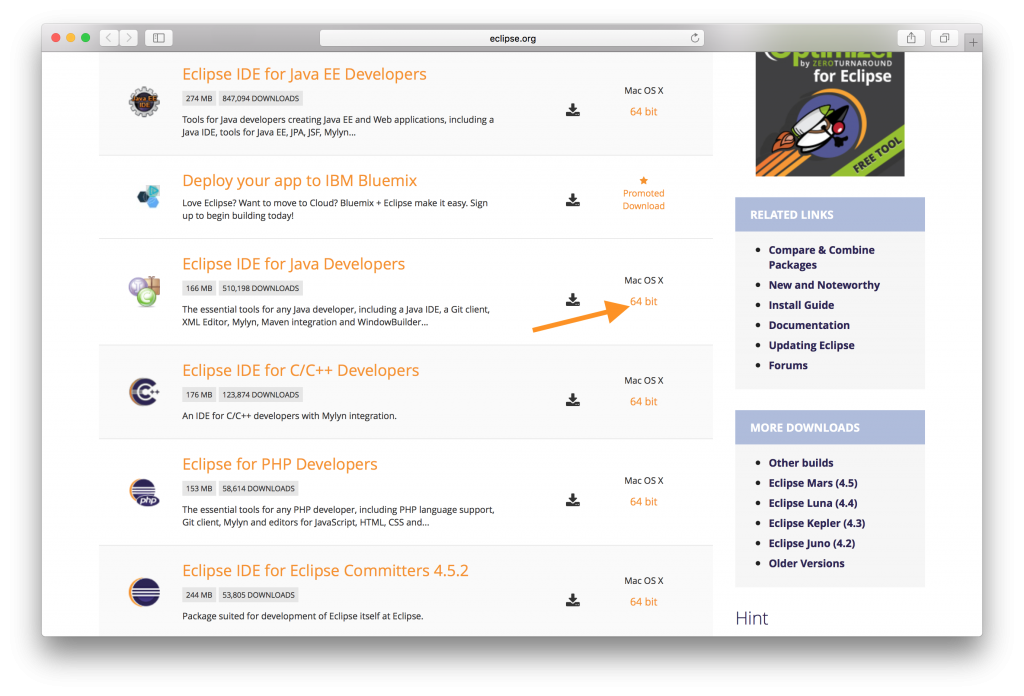Java For Mac Os

Java for Mac OS X 10.5 Update 10 delivers improved compatibility, security, and reliability by updating J2SE 5.0 to 1.5.030, and updating Java SE 6 to 1.6.026 for 64-bit capable Intel-based Macs. J2SE 1.4.2 is no longer being updated to fix bugs or security issues and remains disabled by default in this update. Jun 18, 2013 Java for Mac OS X 10.6 Update 17 delivers improved security, reliability, and compatibility by updating Java SE 6 to 1.6.065. This update enables per-website control of the Java plug-in within Safari 5.1.9 or later. Please quit any web browsers and Java applications before installing this update.
Latest Version:
Java JDK 12.0.2 LATEST
Requirements:
Now, Focus Mode opens at your set zoom level and also shows the page number while you scroll.ExcelGo Easy on Your Eyes with Dark Mode: A dark background is easier on the eyes in low-light environments. Update mac os.
Mac OS X
Author / Product:
Oracle / Java Development Kit for Mac
Old Versions:
Filename:
jdk-12.0.2_osx-x64_bin.dmg
MD5 Checksum:
e4b6a545543f00326a01cfb37cc570be
Details:
Java Development Kit for Mac 2019 full offline installer setup for Mac
Java Development Kit for Mac (often described by Oracle as an “extended” package that expands upon the normal tools that could be find in Java SE Development Kit) hosts wide variety of tools for streamlined developing, debugging, testing, and monitoring of Java applications. The core of the package consists from more than 30 individual tools and service which can effortlessly control every aspect of Java application development, from the concept phase to the final deployment to the end-users.
Contents of the JDK:
Development Tools
(In the bin/ subdirectory) Tools and utilities that will help you develop, execute, debug, and document programs written in the JavaTM programming language.
Runtime Environment
(In the jre/ subdirectory) An implementation of the Java Runtime Environment (JRE) for use by the JDK. The JRE includes a Java Virtual Machine (JVM), class libraries, and other files that support the execution of programs written in the Java programming language.
Additional Libraries
(In the lib/ subdirectory) Additional class libraries and support files required by the development tools.
Demo Applets and Applications
(In the demo/ subdirectory) Examples, with source code, of programming for the Javaplatform. These include examples that use Swing and other Java Foundation Classes, and the Java Platform Debugger Architecture.
Sample Code
(In the sample subdirectory) Samples, with source code, of programming for certain Java API's.
C header Files
(In the include/ subdirectory) Header files that support native-code programming using the Java Native Interface, the JVM Tool Interface, and other functionality of the Javaplatform.
Source Code
(In src.zip) Java programming language source files for all classes that make up the Java core API (that is, sources files for the java.*, javax.* and some org.* packages, but not for com.sun.* packages). This source code is provided for informational purposes only, to help developers learn and use the Java programming language. These files do not include platform-specific implementation code and cannot be used to rebuild the class libraries. To extract these file, use any common zip utility. Or, you may use the Jar utility in the JDK's bin/ directory: jar xvf src.zip. Download Java Development Kit for Mac now!
Also Available: Download Java Development Kit for Windows
In this tutorial, we show you how to set $JAVA_HOME environment variable on latest or older Mac OSX.
1. Mac OSX 10.5 or later
In Mac OSX 10.5 or later, Apple recommends to set the $JAVA_HOME variable to /usr/libexec/java_home, just export $JAVA_HOME in file ~/. bash_profile or ~/.profile.
Why /usr/libexec/java_home?
This java_home can return the Java version specified in Java Preferences for the current user. For examples,
This Mac OSX has three JDK installed.
2. Older Mac OSX
For older Mac OSX, the /usr/libexec/java_home doesn’t exists, so, you should set JAVA_HOME to the fixed path :
